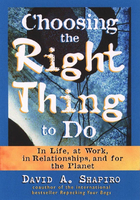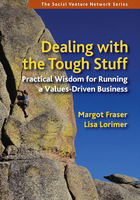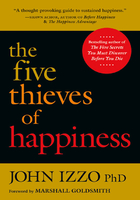THE POWER OF SEEING PEOPLE AS PEOPLE
“Welcome to Lily Ridge!” she called. I could see only her hands and her head as they poked around the corner, but they told me enough to intrigue me. Her smile was genuine and her voice a touch breathy, as though she had just run a short way, almost as if she had hurried down the hall just to poke her head around the corner and welcome me to this nursing home.
“Thanks!” I said, hurrying toward her. “What's your name? What do you do here?” She seemed to be in business clothes rather than scrubs, so there were some fifteen nonnursing jobs she might have worked in. She told me her name, but I didn't catch it as she explained, hurriedly, “I'm on my way to a transport, so I have to go right now, but I'm usually in reception and I saw we had a new person here and I just wanted to make sure you got welcomed!” With that and another brilliant smile, she took off at a business run back down the hall, and I was left just grinning after her.
A person who has shifted to seeing people as people is a delight to be around and has an unlimited capacity to spread positive feelings. But as you might be thinking by now, the shift is easier said than done. People do not develop a good attitude by simply being told they need one or become happy by being told to cheer up. Likewise, none of us shift to seeing others as people simply by knowing we should. And the more entrenched we are in difficult relationships, the harder it is to shift. Fortunately, just because the shift isn't automatic doesn't mean it isn't possible. We can facilitate the process by turning to certain keys, and we'll get to them later. They just turn out not to be what we expect.
This chapter will explore some of the benefits of the shift to seeing people as people, in spite of the counterintuitive fact that it is more demanding and rigorous than seeing them as objects.
A Workplace That Feels like Home
You may be wondering whether seeing people as people really matters. You may be thinking, It's nice, but so are puppies; it doesn't mean they belong at work.
But let's look at this little moment in Lily Ridge. It's the kind of thing that happens when someone is seeing others as people—cheerful, friendly, likeable, welcoming, and in this particular case, kind of adorable. But there's more. I'd only just arrived at the skilled nursing facility, nobody knew I was coming, and I was wearing generic blue scrubs—this receptionist had no way of knowing that I was writing a book or that there was any reason to care what I thought about her facility, but there she was anyway. And her job description certainly didn't require her to greet visitors when she is already halfway out the back door transporting a resident. If her primary concerns were for her own self and needs, she would have spared her feet and just gone on the transport. Her devotion to her responsibility to welcome visitors, her desire to put a friendly face on the facility, arose precisely because her primary concerns were for others: her coworkers and residents who are benefited by her warmth in reception and me, a first-time visitor to a strange place who would feel more comfortable if welcomed.
Like Jason in Blanding, this receptionist was a powerful example of exactly what you want from an employee, coworker, family member, or friend. She'll dash around in uncomfortable business shoes to make a stranger feel welcome and then rush over her own name because she is focused on doing the right thing, not on getting credit for doing it. This is what it looks like when someone is truly seeing other people as people, and I for one can't see any downsides.
Here's another example. At the Rosewood Creek facility, I ran into a pair of nurses who were particularly enthusiastic in talking about HG. It's usually difficult to get licensed nurses to stop and talk because their time is not their own, but these two men had such strong opinions, they both paused their rounds to tell me their experience. They were good friends—one had literally bought a wrong-size wedding band off the other!—and one of them had another higher-paying job at a different facility but still worked at Rosewood Creek because he enjoyed it so much. They had a lot of the same positive comments about family and teamwork as I'd heard in other great facilities (for example, “When I come to work I feel like I'm home”), but I was struck particularly by this comment by one of them: “I've never [before] worked in a place where there's no backbiting and nobody trying to step on others to move up.” In this facility, they told me, there was no gossiping, no backstabbing, no undermining of others. People just did their work and helped one another, and if someone got promoted, all of them could see it was the right person and they were happy for him or her.
The environment they described didn't arise because all the people who worked there were perfect and none of them made mistakes. (I'm sure we would have heard about them by now.) They must have had opportunities for backstabbing and faults to complain of; that's the reality of engaging in life and work with people, that they do things wrong. But here, nobody was capitalizing on others' mistakes, at least not to any significant extent, because they weren't focused on themselves and their status but on helping one another and the residents.
The Hardest Kind of “Soft”
When people see one another as people in the deepest and truest sense, they create an environment that's light-years away from the typical workplace culture of politicking, resentments, and cliques. More than that, it calls them out from petty self-concern to be more engaged and to do more work than if they were seeing others as objects.
Once, a power line collapsed onto a facility in the middle of HG's annual leadership meeting. The executives canceled that meeting to help evacuate more than a hundred patients in a complete power outage. I was shown a picture of a group of them, CEO and all—lit by headlamps and a camera flash—pushing equipment and beds in the middle of the night and grinning like it was the happiest day in their lives.
Now, an executive who's absorbed in himself, even if the business is small, can certainly think of other people who are more suited to lugging hospital beds in the dark after a full day of work than he is. In fact, it will seem obvious that someone has to coordinate and supervise activities from a well-lit place, and that it should be he. After all, that's what the individual SNFs have employees for, to do that kind of work.
On the other hand, a person who's thinking about others and seeing them as real sees that the people in the building with the scared residents are having a much tougher day than whoever sits in the office waiting for updates. She thinks about all the residents who are confused and scared, all the line staff who were caught by surprise and have stayed to help in spite of missed dinners, and she simply and uncomplicatedly wants to help them. She doesn't think about her own warm bed; she thinks about the single mother with a bad back who may be able to go home if another body shows up to help. She doesn't think she is entitled to the clean and dry jobs—she looks for someone who is cold or tired so she can do the heavy lifting and that person can go make phone calls. In every way, the person who is seeing others as people feels called to lift their burdens and minimize their pains rather than her own—even in the dark, even during meetings.
This means seeing people as people is not easier than seeing them as objects; on the contrary, very often it means doing difficult and uncomfortable tasks. When we are absorbed in ourselves and view those around us merely as objects, our own needs and comforts are paramount and we base all our decisions on maximizing those. When other people matter too, then very often their needs are paramount (not always, of course; we aren't less important than others, but we stop feeling like we are more important). The call to honor the reality of the other, the deference we feel when faced with the infinite unknowability of another human creature—these are powerful feelings. And they demand real action from us.
If seeing people as people strikes you as “soft,” I can tell you this: if it's soft, it's soft like a brick.[1] If it's shallow, it's shallow like the Pacific. If it's empty, it's empty like the Nile flooding the surrounding countryside and soaking it with richness and vibrancy to support an empire.
Raoul is an assistant on a large SNF's activities team; he started in maintenance but had “worked his way up,” as he put it. He has the strong accent and groomed facial hair that television had taught me to associate with Los Angeles street gangs. When we met, he was busy painting the nails of a very frail African American lady a bright, showstopping blue. He used careful, practiced strokes and held her hand gently while he talked with me about how much he loved his job. “The guys say painting nails is, like, make me gay,” he told me with a dismissive head shake and a shrug. His friends thought his work was feminizing, silly, laughable; Raoul didn't. “This could be my mother, my grandmother,” he told me, pointing at the women around the table. “It makes them happy.”
He lived in a culture where men are ridiculed for doing gentle things, but he did them anyway, kindly and well. In those old women he saw loving mothers and sisters and daughters and grandmothers, and unmoved by being laughed at by “the guys,” he loved that he could make these deserving women happy with something so simple as nail polish.
I walked in once on Mac, a facility administrator, having an intense conversation with a very stressed-looking couple. I remember the weariness on their faces, the deeply etched tiredness that comes from slow-drain problems like diminishing health or consistent and unflagging financial trouble. Mac told me later that they were family members of a man who had recently been admitted to the facility to recuperate from an unexpected injury. The man fell into that most frustrating of financial categories: too young and well-off to qualify for Medicaid or Medicare but not rich enough to be able to comfortably bear the cost of his care. The man and his family had therefore decided to forgo the recommended physical therapy, a separate charge they were unable to afford.
Mac knew the family was in dire straits, but he also knew that without therapy, this man—otherwise healthy and only in his sixties—would probably never return to his previous level of activity and independence. He had run the numbers and talked to his team of managers and department heads, and they had discussed what skipping therapy would do to this man's vibrant, meaningful life. My interruption had come just before Mac told the family that he would charge them only half the cost of the man's care so they could use the savings to pay for his physical therapy.
“We can't do that all the time,” he emphasized later, not wanting me to get the wrong idea since he and his team can't care for anyone if they don't run the facility responsibly. But on the other hand, margins are so small in nursing homes that one could argue they should never do it anytime. They certainly don't have to. It's not their fault if this man doesn't get therapy—they don't even know him—and those many thousands of dollars they now won't collect will come out of their bonuses at best. But they don't see it that way. “It's the right thing to do,” Mac told me.
Jeremy, the middle executive who sent me to Blanding, told me this was one of the greatest benefits of HG's policy of leaving such decisions to individual SNF leaders and staff. “You're able to make decisions for the benefit of humanity,” he said.
At another SNF, a staff member was tragically murdered; his girlfriend, the mother of his two young children, also worked in the same facility, so everyone in the facility was affected by the news. A couple of days after the tragedy, the administrator of the facility learned that the stunned and shell-shocked family had not done anything to arrange a funeral, so he brought them into his office and helped them through the process, even calling the funeral home when he found it was not charging the family a fair price. The rest of the staff organized a coffee fund-raiser. The administrator told me, his voice rising with emotion, “People who make $10 to $15 an hour would pay $20 for a cup of coffee. That's amazing—to earn twenty bucks after taxes, and they have kids, that's not easy.” But they would hand over $20, crying for the murdered man and his family. The staff raised $3,000.
Seeing people as people is more demanding, challenging, and unyielding than blind disregard; it requires far more of us to see people than to be blind to them. But at the same time, since by definition we are not absorbed in our own selves and comforts, we don't experience that requirement as a burden. We experience it as an opportunity, a gift, to be able to help those amazing, infinite persons. The $20 for coffee was nothing compared to honoring a valued coworker's life. Likewise, Mac's team would prefer to lose a little bonus money than to watch a man's productive life come to an end. This is why we end up with the benefits we've seen: cheerfulness, a willingness to go above and beyond the call of duty, cooperation, and an environment free of envy, backbiting, and hostility.
The Cascade
This isn't just me talking either. Science backs this up.
We get a particular feeling when we see others do something extraordinarily kind or moving or altruistic; we can get the feeling from real life or movies or books or even conversation about such actions. Social psychologist Jonathan Haidt and others have labeled that feeling (quite aptly) as “elevation.”[2] And they have found that when people feel moved, or elevated, by experiencing or witnessing a kindness, they become more likely to do something kind or altruistic themselves. Doing good, or seeing people as people and treating them as such, creates a cascade of other-centered actions that nourish and encourage ever more such kindnesses. As we've seen, it can end up in an entire facility's staff working in openhearted unity with one another. It doesn't make every problem go away, but it increases the number of people who are truly seeing one another and valuing one another, which, I think I can assert, is more pleasant than the reverse.
And seeing people as people can be contagious; when we encounter a person who sees the greatness in others, it can open our eyes to that greatness as well. For example, in one facility there is a resident with dementia; he's not terribly old, he seems to be healthy except for needing a wheelchair, and he has a round pleasant face and a likeable manner. Every morning he wheels his chair to the designated smokers' meeting corner and waits there all day. After every smoke break he returns to his spot to wait for the next one. To everyone who walks by he'll say, “Hi! My dad's dead. He had a stroke.” In that facility I must have gone past that corner eight times, and every time, the man called out “Hi!” and then told me, “My dad's dead. He had a stroke.” He was very friendly and could talk about other things, but the news about his dad always came first. I found him charming and thought briefly that I might describe him as sad but kind of funny. But then I started noticing how the staff treated this man. The people who lived and worked in his facility must have heard about his dad at least a thousand times. A thousand times. And though you might detect slight relief from those who got around the corner unnoticed, the ones who got caught always went through the exchange without even a hint of exasperation.
“My dad's dead. He had a stroke.”
“Yes, I know, I'm so sorry. Can I get you something?” Over and over again, I heard people express sincere condolences for a loss they ought to have been bored sick of but that they treated as seriously as if they were hearing it for the first time.
This obscure man waiting endlessly for his cigarette is no object; he is a delightful, infinite human being, dealing with the limits of a compromised brain. And the unfailing kindness of those who listen to this man, this son, without regard for what's interesting and new to themselves, is one of the sources of a cascade of generosity, kindness, and love that spreads through the facility and out into the lives of everyone who enters there.
I used to have a policy that I wouldn't answer “What's for dinner?” from my kids more than once; it drove me crazy when they kept asking after I'd already responded. But watching nurses, CNAs, and housekeepers in this facility reply, over and over again, “Oh my, that's so sad” to news they'd heard a thousand times already made me feel small. I know the situations are different—I'm pretty sure my kids aren't brain damaged—but I got a glimpse of another way to respond to repetitiveness that made my way look petty and small.
I don't have that rule anymore.
The Yearning
One afternoon I was shadowing Aaron, a regional executive, as he visited different nursing homes in his region. We had gone out to lunch with the administrator of one facility, and when we returned to the building, the director of nursing, a woman named Mina, rushed up to Aaron and the administrator with a thorny problem of some kind or other. Soon the problem absorbed all three of them, and I stepped back out of the group; I couldn't follow the discussion but didn't want to interrupt, so I figured I'd go meet some other people.
But as I stood there thinking about my next move, this three-person conversation caught my attention again. As I watched them, Mina reached her arm around Aaron's waist in an affectionate half hug; still talking, he kindly and casually put his arm across her shoulders. She reached around the administrator with her other arm, who also responded with an arm across her small shoulders, and the three of them started walking away together. They went down the hall, arms about one another, and started laughing about something together like childhood best friends, like it was the easiest thing in the world, like they were in it together.
Do you not yearn for moments like that in your own life? Now, maybe in your work environment, putting your arm around your reports wouldn't be appropriate; this is a care industry, and some of the cultural rules are different. But in this moment, as these three people walk down the hall holding on to each other, the physical touching is just a metaphor anyway for how they feel. The walking together shows the trust, the affection, the reliance, and the unconscious confidence in one another. And any of us can yearn for that feeling—that feeling of being cared for, of solving problems with people who are engaged with us, of being united in a cause, of trusting one another with our problems and our affection. The quality of seeing people as people and living with them in that way is what leads to moments like this.
The trick is, we can't have those moments with people we are seeing as objects, any more than we can have unifying moments with actual objects, such as chairs and tables. The yearning we feel for a clearer, more expansive life full of support and meaning and the sweet-toned laughter of loyal friends is—if we but knew it—the yearning for the shift. We long to shift to a world where we are freed from crippling self-absorption and able to see those around us in the richness of their humanity, and yet we so often find ourselves sitting alone, surrounded by objects.
There is an answer, I promise. But before we can articulate it, we have a few more lessons to learn from the skilled nursing industry.
注释:
[1]The phrase “soft like a brick” was coined by chief leadership officer Duane Boyce when he worked for the Arbinger Institute. It refers to the way the outward mindset might initially seem meek and weak but turns out to be powerful in both its demands and its effects. Duane uses the same phrase now that he works for the company I am calling HG, and it has entered the company's language as a kind of catchphrase.
[2]For just a sample of recent research on elevation, see Sara B. Algoe and Jonathan Haidt, “Witnessing Excellence in Action: The ‘Other-Praising’ Emotions of Elevation, Gratitude, and Admiration,” Journal of Positive Psychology 4, no. 2 (2009): 105-127, Keith S. Cox, “Elevation Predicts Domain-Specific Volunteerism 3 Months Later,” Journal of Positive Psychology 5, no. 5 (2010): 333-341, and Simone Schnall, Jean Roper, and Daniel M. T. Fessler, “Elevation Leads to Altruistic Behavior,” Psychological Science 21, no. 3 (2010): 315-320,
The effects of elevation are closely tied with other research into the ways that human behavior exhibits contagion effects. For a more accessible discussion of the fascinating research on how human behaviors, including altruistic and inspirational ones, can be “contagious,” check out Nicholas A. Christakis and James H. Fowler, Connected: The Surprising Power of Our Social Networks and How They Shape Our Lives (New York: Little, Brown, 2009).
For some informative recent articles that support my particular purposes here, see James H. Fowler and Nicholas A. Christakis, “Cooperative Behavior Cascades in Human Social Networks,” Proceedings of the National Academy of Sciences 107, no. 12 (2010): 5334-5338; and Joseph Chancellor et al., “Everyday Prosociality in the Workplace: The Reinforcing Benefits of Giving, Getting, and Glimpsing,” Emotion (June 5, 2017),














